Unit 5 Amazing things Grammar课件(共20张PPT)
文档属性
| 名称 | Unit 5 Amazing things Grammar课件(共20张PPT) | 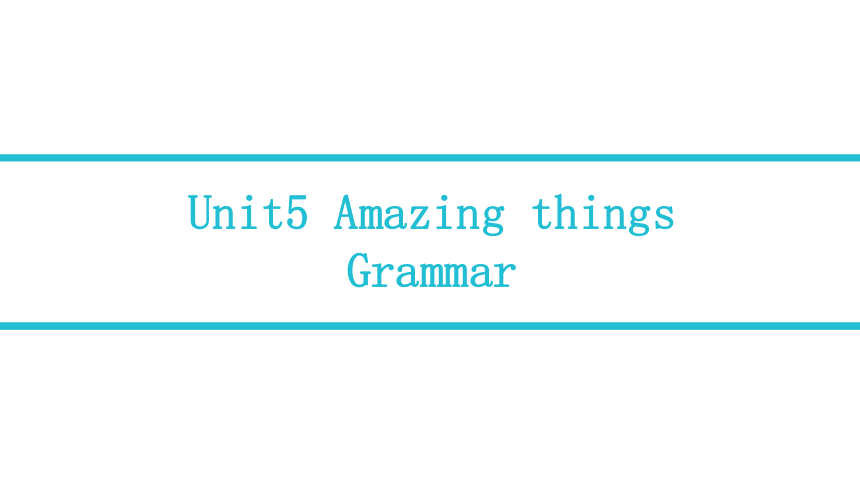 | |
| 格式 | zip | ||
| 文件大小 | 889.2KB | ||
| 资源类型 | 教案 | ||
| 版本资源 | 牛津译林版 | ||
| 科目 | 英语 | ||
| 更新时间 | 2022-02-18 22:38:38 | ||
图片预览

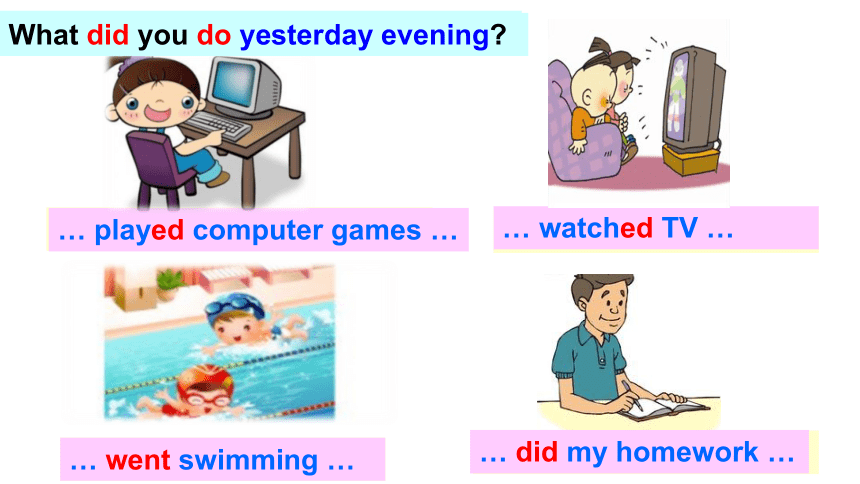
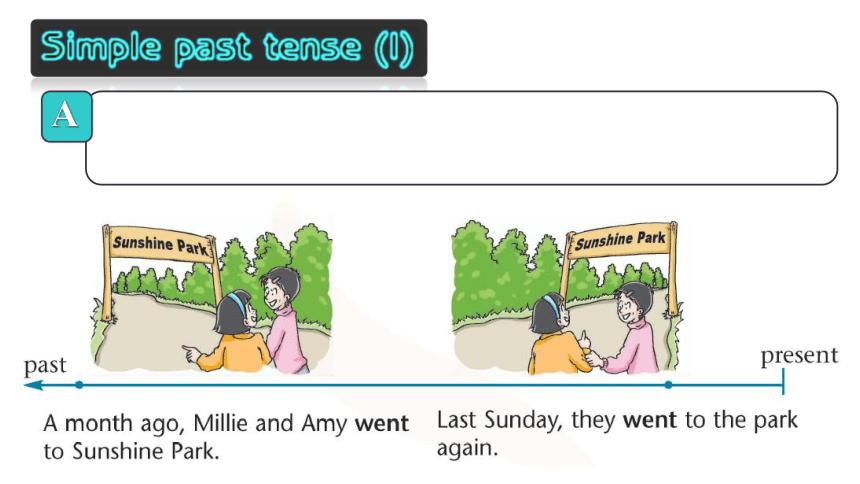
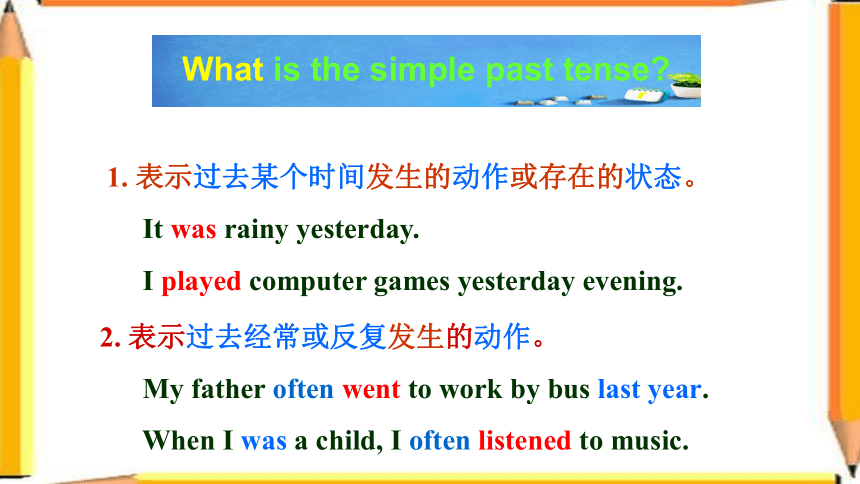
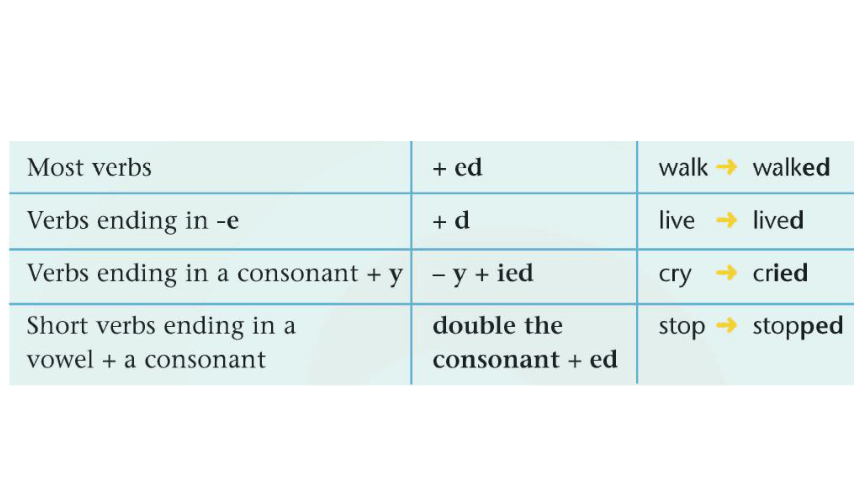
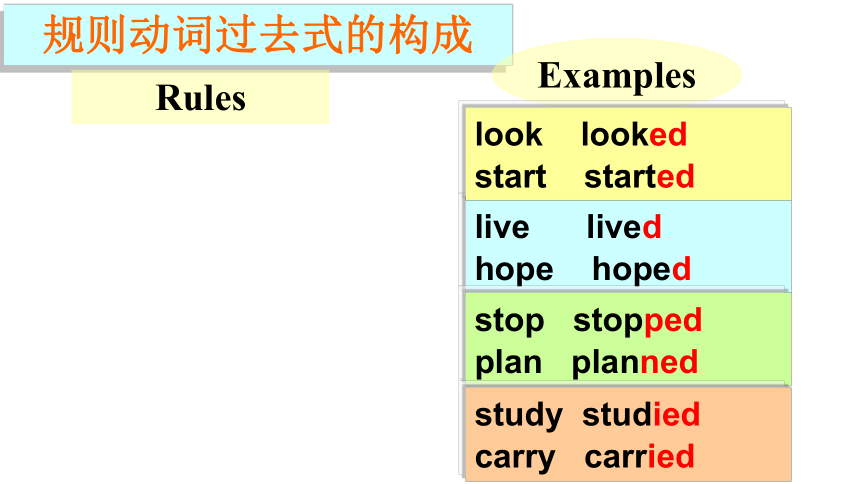
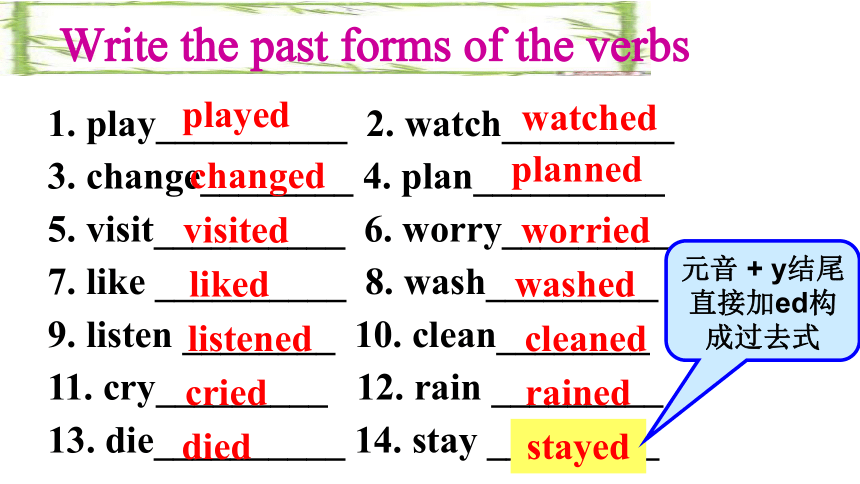
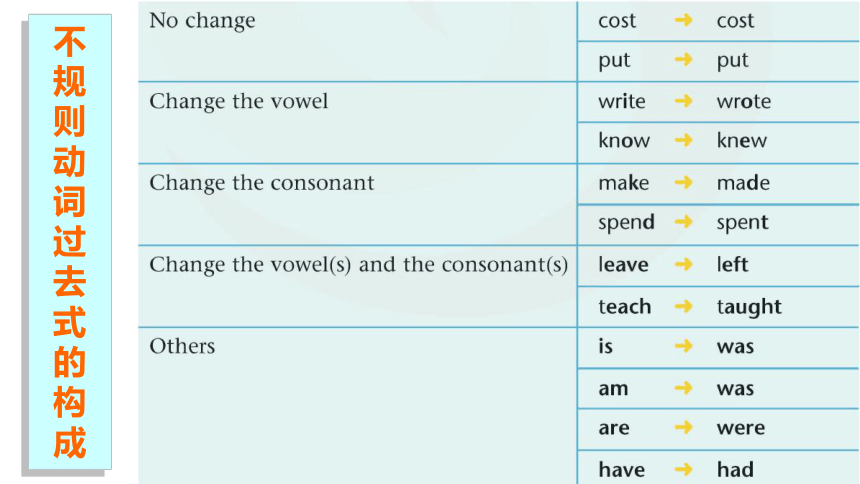
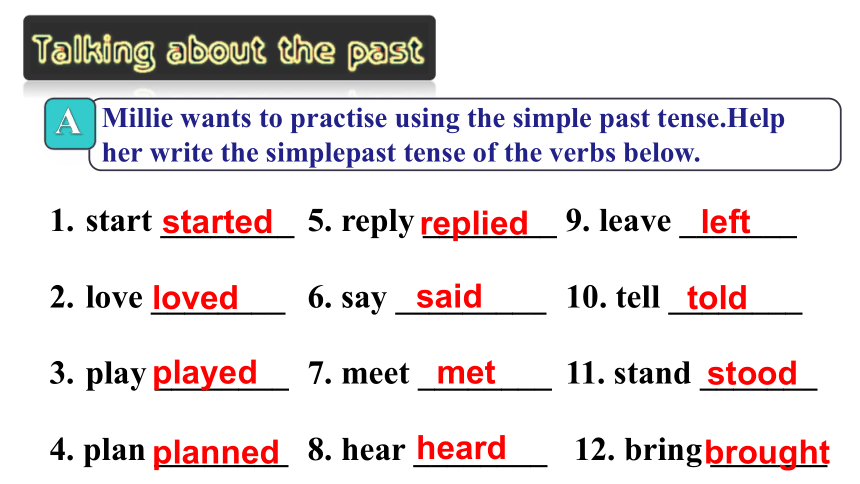
文档简介
(共20张PPT)
Unit5 Amazing things
Grammar
What do you do every evening
… play computer games…
… watch TV…
… go swimming …
… do my homework …
… played computer games …
… watched TV …
… went swimming …
What did you do yesterday evening
… did my homework …
A
1. 表示过去某个时间发生的动作或存在的状态。
It was rainy yesterday.
I played computer games yesterday evening.
2. 表示过去经常或反复发生的动作。
My father often went to work by bus last year.
When I was a child, I often listened to music.
What is the simple past tense
规则动词过去式的构成
Rules
Examples
2. 以e结尾加-d
直接加-ed
live lived hope hoped
look looked start started
3. 重读闭音, 双写加-ed
stop stopped
plan planned
4. 辅音字母 + y,
变y为i,加-ed
study studied
carry carried
1. play__________ 2. watch_________
3. change________ 4. plan__________
5. visit__________ 6. worry_________
7. like __________ 8. wash_________
9. listen ________ 10. clean________
11. cry_________ 12. rain _________
13. die__________ 14. stay _________
played
watched
changed
planned
visited
worried
liked
washed
listened
cleaned
cried
rained
stayed
died
Write the past forms of the verbs
元音 + y结尾 直接加ed构成过去式
不规则动词过去式的构成
Millie wants to practise using the simple past tense.Help
her write the simplepast tense of the verbs below.
A
start ________ 5. reply ________ 9. leave _______
love ________ 6. say _________ 10. tell ________
play ________ 7. meet ________ 11. stand _______
4. plan ________ 8. hear ________ 12. bring _______
started
loved
played
planned
replied
said
met
heard
left
told
stood
brought
The students visited the Fun World Museum.Here is Millie's
diary entry. Helpher complete it with the simple past tense
of the verbs in brackets.
B
This morning, we (go) to the Fun World Museum.
When we (get) to the museum, there (be) a lot
of people there. We (spend) three hours in the museum.
I (take) a lot of photos. Some of us (buy) cards of
the animals there. We (come) back to school at 1 p.m.
We (have) a great time.
went
got
were
spent
took
bought
came
had
yesterday
last …
… ago
yesterday morning/ afternoon …
last night/month/ week/year/ Tuesday …
two days ago/a week ago/three years ago/a few minutes ago …
just now = a moment ago
in + 过去的年份
in 2008/1990/1998
this morning
the day before yesterday
When to use the simple past tense
Key words
Daniel did not go to the Fun World Museum. Millie is telling
him about thevisit.Help Millie complete the conversation.
C
Millie: We (go) to the Fun World Museum the
day before yesterday, Daniel. It (be) so interesting!
Daniel: Really Tell me all about it.
Millie: OK. We (see) a small monkey, only 11 centimetres tall.
Daniel: That’s amazing! What else
Millie: We also _______________ (learn) about some strange
birds like dodos. They (live) on the earth a long
time ago.
Daniel: That’s cool!
went
was
saw
learnt/learned
lived
语法聚焦
[一般过去时(Ⅰ)]
教材典句
1.When we got to the museum, there were a lot of people there.当我们到了博物馆,那儿有许多人。
2.We went to the Fun World Museum the day before yesterday, Daniel.丹尼尔,我们前天去了趣味世界博物馆。
3.They lived on the earth a long time ago.
很久以前它们就生活在地球上。
1.基本用法
(1)表示在过去某个特定时间发生的动作或存在的状态。
He suddenly fell ill yesterday. 昨天他突然生病了。
(2)表示过去经常发生的动作或存在的状态。
I wrote home once a week at college. 上大学时,我一周给家里写一封信。
语法探究
(3)表示过去连续发生的一系列动作。
The students got up early in the morning, did morning exercises and then read English aloud in the open air.
学生们早晨很早起床,做早操,然后在户外大声读英语。
(4)在时间状语从句和条件状语从句中表示过去将要发生的动作。
We would not leave until the teacher came back.
直到老师回来我们才会离开。
2.常用的时间状语:yesterday, last night, a moment ago, last week, yesterday morning, just now, ten years ago, in 1998, this morning, the other day, in the past等。
3.动词过去式的变化规则:
(1)一般情况下,直接在词尾加 ed。如:ask—asked
(2)以不发音的字母e结尾的动词,直接在词尾加 d。如:save—saved
(3)以“辅音字母+y”结尾的动词,变y为i再加 ed。如:carry—carried
(4)以重读闭音节结尾,且末尾只有一个辅音字母的动词,先双写这个辅音字母,再加 ed。如:stop—stopped
4.动词过去式的不规则变化见课本附录的表格。
1.2019·昆明 —Where did you go last winter vacation
—I ________ to London with my family.
A.go
B.have gone
C.went
D.was going
C
活 学 活 用
2.The boy often ________ up at 5:30, but he ________ up at 6:00 yesterday.
A.gets; got
B.gets; gets
C.got; gets
D.get; get
A
GOOD JOB
Unit5 Amazing things
Grammar
What do you do every evening
… play computer games…
… watch TV…
… go swimming …
… do my homework …
… played computer games …
… watched TV …
… went swimming …
What did you do yesterday evening
… did my homework …
A
1. 表示过去某个时间发生的动作或存在的状态。
It was rainy yesterday.
I played computer games yesterday evening.
2. 表示过去经常或反复发生的动作。
My father often went to work by bus last year.
When I was a child, I often listened to music.
What is the simple past tense
规则动词过去式的构成
Rules
Examples
2. 以e结尾加-d
直接加-ed
live lived hope hoped
look looked start started
3. 重读闭音, 双写加-ed
stop stopped
plan planned
4. 辅音字母 + y,
变y为i,加-ed
study studied
carry carried
1. play__________ 2. watch_________
3. change________ 4. plan__________
5. visit__________ 6. worry_________
7. like __________ 8. wash_________
9. listen ________ 10. clean________
11. cry_________ 12. rain _________
13. die__________ 14. stay _________
played
watched
changed
planned
visited
worried
liked
washed
listened
cleaned
cried
rained
stayed
died
Write the past forms of the verbs
元音 + y结尾 直接加ed构成过去式
不规则动词过去式的构成
Millie wants to practise using the simple past tense.Help
her write the simplepast tense of the verbs below.
A
start ________ 5. reply ________ 9. leave _______
love ________ 6. say _________ 10. tell ________
play ________ 7. meet ________ 11. stand _______
4. plan ________ 8. hear ________ 12. bring _______
started
loved
played
planned
replied
said
met
heard
left
told
stood
brought
The students visited the Fun World Museum.Here is Millie's
diary entry. Helpher complete it with the simple past tense
of the verbs in brackets.
B
This morning, we (go) to the Fun World Museum.
When we (get) to the museum, there (be) a lot
of people there. We (spend) three hours in the museum.
I (take) a lot of photos. Some of us (buy) cards of
the animals there. We (come) back to school at 1 p.m.
We (have) a great time.
went
got
were
spent
took
bought
came
had
yesterday
last …
… ago
yesterday morning/ afternoon …
last night/month/ week/year/ Tuesday …
two days ago/a week ago/three years ago/a few minutes ago …
just now = a moment ago
in + 过去的年份
in 2008/1990/1998
this morning
the day before yesterday
When to use the simple past tense
Key words
Daniel did not go to the Fun World Museum. Millie is telling
him about thevisit.Help Millie complete the conversation.
C
Millie: We (go) to the Fun World Museum the
day before yesterday, Daniel. It (be) so interesting!
Daniel: Really Tell me all about it.
Millie: OK. We (see) a small monkey, only 11 centimetres tall.
Daniel: That’s amazing! What else
Millie: We also _______________ (learn) about some strange
birds like dodos. They (live) on the earth a long
time ago.
Daniel: That’s cool!
went
was
saw
learnt/learned
lived
语法聚焦
[一般过去时(Ⅰ)]
教材典句
1.When we got to the museum, there were a lot of people there.当我们到了博物馆,那儿有许多人。
2.We went to the Fun World Museum the day before yesterday, Daniel.丹尼尔,我们前天去了趣味世界博物馆。
3.They lived on the earth a long time ago.
很久以前它们就生活在地球上。
1.基本用法
(1)表示在过去某个特定时间发生的动作或存在的状态。
He suddenly fell ill yesterday. 昨天他突然生病了。
(2)表示过去经常发生的动作或存在的状态。
I wrote home once a week at college. 上大学时,我一周给家里写一封信。
语法探究
(3)表示过去连续发生的一系列动作。
The students got up early in the morning, did morning exercises and then read English aloud in the open air.
学生们早晨很早起床,做早操,然后在户外大声读英语。
(4)在时间状语从句和条件状语从句中表示过去将要发生的动作。
We would not leave until the teacher came back.
直到老师回来我们才会离开。
2.常用的时间状语:yesterday, last night, a moment ago, last week, yesterday morning, just now, ten years ago, in 1998, this morning, the other day, in the past等。
3.动词过去式的变化规则:
(1)一般情况下,直接在词尾加 ed。如:ask—asked
(2)以不发音的字母e结尾的动词,直接在词尾加 d。如:save—saved
(3)以“辅音字母+y”结尾的动词,变y为i再加 ed。如:carry—carried
(4)以重读闭音节结尾,且末尾只有一个辅音字母的动词,先双写这个辅音字母,再加 ed。如:stop—stopped
4.动词过去式的不规则变化见课本附录的表格。
1.2019·昆明 —Where did you go last winter vacation
—I ________ to London with my family.
A.go
B.have gone
C.went
D.was going
C
活 学 活 用
2.The boy often ________ up at 5:30, but he ________ up at 6:00 yesterday.
A.gets; got
B.gets; gets
C.got; gets
D.get; get
A
GOOD JOB
